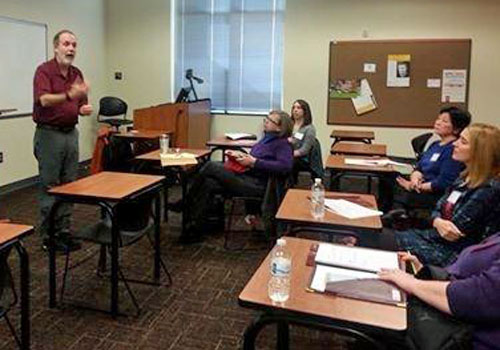
GPC’s Dr. John Weber talks to a group of math instructors about using humor in statistics during the GPC Math Conference. (photo by Rebecca Rakoczy)
GPC math prof is making learning statistics fun
Worried about that statistics test? Just hum a few bars.
Comic strips, rap videos and the tune of “Twinkle, Twinkle Little Star” may not seem like conventional teaching tools for your typical college math classroom, but Dr. John Weber uses all of these—and more—to get his students to understand statistics.
For the past three years, the Georgia Perimeter College math instructor has been part of Project UPLIFT, a National Science Foundation project in collaboration with The Ohio State University and the University of Texas at El Paso.
The program seeks to ease anxiety about statistics through engaging classroom lessons, including cartoons, jokes, quotes, songs, poems, wordplay and videos. The UPLIFT acronym stands for a somewhat longer definition: Universal Portability of Learning Increased by Fun Teaching.
“It’s all about engaging students and helping them retain information by making statistics fun,” Weber says.
Weber presented some of his classroom techniques to other math educators during the 15th Annual Mathematics Conference held at GPC Newton Campus on Feb. 13. The conference attracted more than 180 college, high school and middle school math instructors from across the Southeast.
As part of the Project UPLIFT program, Weber has been gathering data from his introduction to statistics classes regarding these novel student engagement techniques. What he’s found so far: Singing a familiar tune while learning a formula helps retention and, while reading a comic is fun, it doesn’t help as much.
“It seems like student retain more information from ‘singing’ a formula, than just remembering something by reading a cartoon,” he says. “Even singing badly helps you retain information.”
Weber told the conference attendees that faculty can encourage students by singing themselves. “It doesn’t matter if we fail (as singers),” he says. “Students actually enjoy that we try.”
